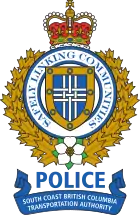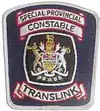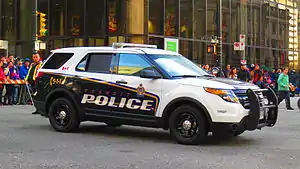Metro Vancouver Transit Police
The Metro Vancouver Transit Police (MVTP), previously the Greater Vancouver Transportation Authority Police Service and formally the South Coast British Columbia Transportation Authority Police Service (SCBCTAPS), is the police force for TransLink, the public transit system of the Metro Vancouver region of British Columbia, Canada.
| South Coast British Columbia Transportation Authority Police Service | |
|---|---|
 Heraldic badge of the SCBCTAPS | |
| Common name | Metro Vancouver Transit Police |
| Abbreviation | MVTP (branding) SCBCTAPS (official) |
| Motto | Safely Linking Communities |
| Agency overview | |
| Formed | December 4, 2005 |
| Preceding agencies |
|
| Employees | 234[1] |
| Annual budget | CA$32 million[2] |
| Jurisdictional structure | |
| Operations jurisdiction | British Columbia, Canada |
| Size | 134 km (83 mi) of heavy and light rail track, 57 rail stations, over 195 bus routes, 3 passenger ferries |
| Population | 2,463,700 in 2,877 km2 (1,111 sq mi) (Metro Vancouver) |
| Constituting instruments | |
| General nature | |
| Operational structure | |
| Overviewed by | South Coast British Columbia Transportation Authority Police Service Board |
| Headquarters | 300 - 287 Nelson's Court, New Westminster |
| Police officers | 167[1] |
| Civilians | 67[1] |
| Elected officer responsible |
|
| Agency executive |
|
| Parent agency | South Coast British Columbia Transportation Authority |
| Units | Patrol, Communications, Explosive Detection Dog, Bicycle Patrol, Crime Reduction, Intelligence, Training & Recruiting, Professional Standards |
| Division Offices | West - Richmond |
| Facilities | |
| Explosives detection dogs | 4 Labrador Retrievers |
| Website | |
| transitpolice | |
| Mark Reder[3] is the chair of the Transit Police Board. Unlike other similar organizations in British Columbia, he is not elected into position. | |
Formed in December 2005, the Metro Vancouver Transit Police is the only police force in Canada solely dedicated to transit, as most other cities use a combination of special constables and a transit division of their local police. Transit Police are a supplementary police agency with the jurisdictional police agency retaining primary responsibility for policing in each jurisdiction they serve.
Transit Police officers have the same authorities and powers as other police officers while on and off duty. They are sworn in as designated provincial constables, with full police powers throughout the province. They focus their efforts primarily on protecting the safety and security of passengers, employees, property, and revenue of Metro Vancouver's transit system.[4]
Transit Police partner with local municipal police forces and Royal Canadian Mounted Police (RCMP) in enforcing laws in the Metro Vancouver region. If requested, Transit Police officers will also respond to emergencies outside of transit property as would other municipal police forces.
The name change was made pursuant to the Greater Vancouver Transportation Authority Amendment Act 2007, effective November 30, 2007. However, references to SCBCTAPS as GVTAPS will continue to have legal effect.[5]
Transit Police, along with other BC police forces including the RCMP, seconds officers to the Combined Forces Special Enforcement Unit of British Columbia.
History
The first persons employed for protection of mass transit in Vancouver were the night watchmen of the BC Electric Railway, established 1897. As the system grew, the company used the provisions of the provincial Railway Act to employ Special Constables. During the Great War, several special constables were posted to key infrastructure to protect against sabotage. After the war's end, these constables were appointed less frequently, leaving watchmen to protect the system.
During World War II, an armed special constabulary was established - again intended to protect against sabotage - named the Special Protection Force. After victory in Japan, they were disbanded. The company began transitioning the watchmen to security officers, and those security officers would remain as the company was nationalized and became BC Hydro. As BC Transit was created, the security officers responsible for transit became employed by them.[6]

At the opening of the first SkyTrain line in December 1985, 15 Special Provincial Constables (SPCs) were appointed to BC Transit Security. SPCs did not carry firearms, but did carry pepper spray and batons. As the transit system grew, so did the scope and responsibility of these peace officers. In 1999, as the responsibility of transit and transportation on the south coast of British Columbia was reassigned to TransLink (Greater Vancouver Transportation Authority), they became the SPCs new employers.[7]
Initially, the SPCs contacted the Vancouver Police Department and, later, the New Westminster Police Department when they needed to query persons and vehicles. As their needs grew, they earned their own access to police databases and records, getting the attention of the provincial government. The BC government recognized that the SPCs were never initially meant to enforce drug laws or enter into criminal investigations but saw the need for same. SPCs did not have authority to enforce drug laws under the Controlled Drugs and Substances Act (Police Enforcement) Regulation. The police services division of the government re-iterated that the SPCs authority was limited to transit property, and they could not stop suspects fleeing from a separate crime scene or intervene in incidents occurring just outside SkyTrain stations.[7]
In 2003, the BC Association of Chiefs of Police supported TransLink's application to have a Designated Policing Unit under the newly created section of the Police Act. Over the next couple of years, the necessary processes took place, and the Transit Police became operational in December, 2005. Many of the SPCs stayed on, after completing the full training at the Police Academy at the Justice Institute of British Columbia to become full constables.[7][8]
In November 2007, the Greater Vancouver Transportation Authority was renamed the "South Coast British Columbia Transportation Authority" pursuant to the Greater Vancouver Transportation Authority Amendment Act 2007, and the police force followed suit.
Organization

The Transit Police report to the South Coast British Columbia Transportation Authority Police Board (SCBCTA Police Board). The Police Board is responsible for the governance and oversight of the SCBCTAPS. The board is responsible for appointing officers, including the Chief Officer and Deputy Chief Officer, approving finances and the budget, and establishing policy. Unlike other BC municipal police forces, the Police Board only has appointed members and does not have any democratically elected member (whereas mayors in other police boards act as the chair).[9]
Their numbers have remained steady since 2010, at 167 sworn officers.[10] The most senior officer is Dave Jones, Chief Officer of the Transit Police.
Community Partnerships
Inter-Regional at Risk Youth Link (IRAYL) - Transit Police have been working in close partnership with IRAYL since 2008. IRAYL is a unique partnership/youth outreach program that provides support and resources to marginalized youth, founded in part by a Transit Police officer, formerly a youth worker. The team comprises experienced youth workers who work in and around SkyTrain and Canada Line stations to provide youth with access to much needed services, like shelters, social services, food banks, counselling, recreation and youth centers, as part of a cross-regional crime reduction initiative.[11]
In 2012, IRAYL in conjunction with Transit Police and the Ministry of Children and Family Development was awarded the Premier’s Innovation & Excellence Awards Program.[12]
Collingwood Community Policing Centre - Transit Police entered into an agreement with Collingwood Community Policing Centre, a Vancouver Police Department CPC, to serve in public outreach and education for the Transit Police.[13]
Surrey Crime Prevention Society - In 2015, Transit Police began a partnership with Surrey Crime Prevention Society called Transit Watch where volunteers proactively patrol transit hubs in the city of Surrey, BC. [14]
Hollaback! Vancouver - Also in 2015, as part of efforts to reduce sexual offences onboard transit, Transit Police and Hollaback! Vancouver began an online awareness campaign.[15]
Controversy
As the only transit police force in Canada,[16] there was concern by transit employee unions and interest groups when the decision to arm members was made. The province and BC Association of Chiefs of Police agreed that their designation as police would require the issuance of firearms.[17]
News reports in April 2008 alleged the misuse of Tasers by Transit Police members. It was reported that officers used the Tasers on offenders for the mispayment of transit fares.[18] A 2010 inquiry found that the incidents of taser usage by the Transit Police were legally justified, given the offenders were actively resisting or assaultive toward police during an investigation.[19]
In recent years, arguments have been made that the Transit Police is not an effective use of TransLink's funding or police resources, as one of their primary duties is checking transit fares and issuing tickets.[20] Reports from both sides argue reasons for the existence of police on an urban transit system, and whether a different policing model would be more effective.[21]
See also
Notes
- "2014 Annual Report" (PDF). Transit Police. Retrieved May 14, 2015.
- Translink 2014 Base Plan and Outlook
- Board members
- "Policing in B.C." Government of British Columbia. Retrieved April 8, 2019.
- Greater Vancouver Transportation Authority Amendment Act 2007 Final version of the Act
- "History". transitpolice.ca. Retrieved March 17, 2017.
- "2012 VPD Audit". Transit Police website. Retrieved June 26, 2012.
- "New Transit Police on the Job". Ministry of Public Safety and Solicitor General. December 5, 2005. Retrieved November 16, 2006.
- SCBCTAPS Police Board
- "Police Resources in British Columbia, 2016" (PDF). B.C. Ministry of Justice. Retrieved April 8, 2019.
- "I-RAYL reaches out on SkyTrain to at-risk youth". Burnaby Newsleader. Retrieved May 21, 2015.
- "Transit Police and the Ministry of Children and Family Development have been Awarded the Premier's Award". TransLink.ca. Retrieved May 21, 2015.
- Community Policing
- "Transit Watch program launched to help stop crime in Surrey, B.C." CBC News. Retrieved May 14, 2015.
- "Hollaback! Vancouver and Metro Vancouver Transit Police team up to help end harassment on transit". Hollaback!. Retrieved August 31, 2015.
- "Vancouver transit police begin packing guns". CBC News. December 5, 2005. Retrieved December 25, 2006.
- Smith, Charlie (September 8, 2005). "Transit gun plan draws fire". The Georgia Straight. Retrieved March 15, 2013.
- "B.C. transit police stun fare cheaters with Taser". CBC News. April 16, 2008. Retrieved May 5, 2008.
- "Transit Police Report on C.E.W. Use". March 5, 2010. Retrieved March 15, 2013.
- "Report pans Metro Vancouver's Transit Police model". Surrey North Delta Leader. March 14, 2012. Retrieved March 15, 2013.
- "Mayors question need for Transit Police". Huffington Post. February 21, 2013. Retrieved March 15, 2013.